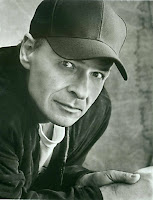In The Lake of the Woods
I think Tim O'Brien lives in Texas now, but this author grew up first in Austin and then Worthington, Minnesota, and tends to write stories and books that connect to his homeplace. I listened to him read and talk about writing and life last spring in Chaska, and although everyone was asking him questions about The Things They Carried, he did slip in an admission that he believes his best book is his 1994 novel In The Lake of the Woods. The comment stayed with me. I wondered why. So when I was thinking of the next MN-based novel I could take in, his title came to mind.
The Lake of the Woods. It sounds mythic, doesn't it? Something you get lost in.
As I read the book, I came to believe that this was exactly what O'Brien intended. The themes include deception and mystery, loneliness and memory, and I was impressed by how well these inner states fit with O'Brien's description of the setting:
It would take me six and a half hours in a well-gassed car to get to the southern most point of the lake. And to get to Angle Inlet, where John Wade's cabin is located, I would have to take a small plane. All around me would be blue and green, even in the winter. O'Brien has painted a picture of a wildness so deep that it is almost dangerous. People get lost, he is saying. And sometimes it takes a dose of disorientation to find your way to freedom. I can relate to that. Who can't?
This book has intrigued me, made me long afresh for wilderness. I'm sure I'll say it again and again in my life: there are so many places on earth that are worth our close attention. The Lake of the Woods seems to be one of them, and I'm grateful that, through his words, Tim O'Brien has offered up a lens.
The Lake of the Woods. It sounds mythic, doesn't it? Something you get lost in.
As I read the book, I came to believe that this was exactly what O'Brien intended. The themes include deception and mystery, loneliness and memory, and I was impressed by how well these inner states fit with O'Brien's description of the setting:
"The wilderness was massive. It was a place, Wade came to understand, where lost was a rule of thumb. The water here was the water there. Nothing in particular, all in general. Forests folded into forests, sky swallowed sky. The solitude bent back on itself. Everywhere was nowhere. It was perfect unity, perfect oneness, the flat mirroring waters giving off exact copies of other copies, everything in multiples, everything hypnotic and blue and meaningless, always the same. Here, Wade decided, was where the vanished go. The dropped nickels. The needles in haystacks." (239)The book is rich in images, and I came away with stark mental pictures of what the Mai Lai Massacre in Vietnam might have been like, what PTSD can do to a man, what it can do to a relationship. But it was where John Wade did his untangling of memory--The Lake of the Woods--that seemed both the most real and far away.
It would take me six and a half hours in a well-gassed car to get to the southern most point of the lake. And to get to Angle Inlet, where John Wade's cabin is located, I would have to take a small plane. All around me would be blue and green, even in the winter. O'Brien has painted a picture of a wildness so deep that it is almost dangerous. People get lost, he is saying. And sometimes it takes a dose of disorientation to find your way to freedom. I can relate to that. Who can't?
This book has intrigued me, made me long afresh for wilderness. I'm sure I'll say it again and again in my life: there are so many places on earth that are worth our close attention. The Lake of the Woods seems to be one of them, and I'm grateful that, through his words, Tim O'Brien has offered up a lens.







Lake of the Woods is kind of an eerie place, at least it seemed that way to me the couple of times I've been there. Beautiful, but you can feel very alone.
ReplyDeleteThis is exactly the feeling I got from this book. Can you comment on the difference between this locale and the Boundary Waters? I do hope to get lost there some day (at least for a while). Thanks for the comment!
ReplyDeleteI venture to wilderness a couple times of year, where people are few if not nonexistent, stars are many, and there are trees to seem to reach to the end of the earth.
ReplyDeleteI like it because I feel small. I feel lost. I feel inconsequential, and the natural world feels so imposing.
Feelings that are hard to recognize in the civilized world.
Gorgeous. And now you've added another book to my extremely long MUST READ list. ;)
ReplyDeleteI love this novel.
ReplyDelete